Related Research Articles
Moldovan or Moldavian is one of the two local names for the Romanian language in Moldova. Moldovan was declared the official language of Moldova in Article 13 of the constitution adopted in 1994, while the 1991 Declaration of Independence of Moldova used the name Romanian. In 2003, the Moldovan parliament adopted a law defining Moldovan and Romanian as glottonyms for the same language. In 2013, the Constitutional Court of Moldova interpreted that Article 13 of the constitution is superseded by the Declaration of Independence, thus giving official status to the name Romanian. The breakaway region of Transnistria continues to recognize "Moldavian" as one of its official languages, alongside Russian and Ukrainian. Ukraine also continued until recently to make a distinction between Moldovan and Romanian, with one village declaring its language to be Romanian and another declaring it to be Moldovan, though Ukrainian officials have announced an intention to remove the legal status of Moldovan. On 16 November, the Ministry of Education and Science of the Ukrainian government stated that it has initiated steps to abolish the Moldovan language and to replace it with Romanian. On 13 January 2024, Ukrainian newspaper Dumska reported that the Ukrainian Ministry of Education and Science had announced all 16 schools in Odesa Oblast teaching "Moldovan" had dropped the term in favor of Romanian. On 16 March 2023, the Moldovan Parliament approved a law on referring to the national language as Romanian in all legislative texts and the constitution. On 22 March, the president of Moldova, Maia Sandu, promulgated the law.

Orhei, also formerly known as Orgeev, is a city, municipality and the administrative centre of Orhei District in the Republic of Moldova, with a population of 21,065. Orhei is approximately 40 kilometres north of the capital, Chișinău.

Cahul is a city and municipality in southern Moldova. The city is the administrative center of Cahul District; it also administers one village, Cotihana. As of 2014 census, the city has a population of 30,018.
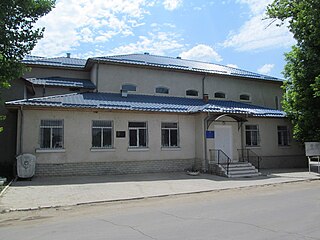
Nisporeni is a town in Moldova and the administrative center of Nisporeni District.

Căușeni is a town and the administrative center of Căușeni District, Moldova.
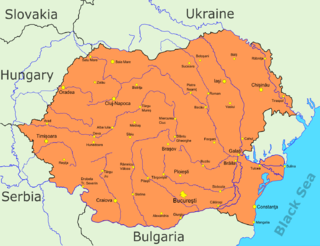
The unification of Moldova and Romania is a popular concept and hypothetical unification in the two countries that began during the Revolutions of 1989. The Romanian Revolution in 1989 and the independence of Moldova in 1991 further contributed to the development of a movement for the unification of the two Romanian-speaking countries. The question of reunification is recurrent in the public sphere of the two countries, often as a speculation, both as a goal and a danger. Though historically Romanian support for unification was high, a March 2022 survey following the Russian invasion of Ukraine indicated that only 11% of Romania's population supports an immediate union, while over 42% think it is not the right moment.
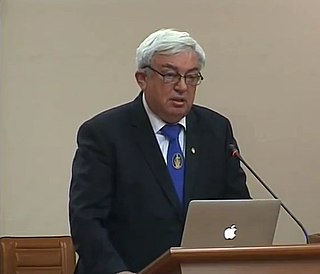
Gheorghe Duca is a Moldovan academic and politician who is a former president of the Academy of Sciences of Moldova, an honorary member of the Romanian Academy, and former Moldovan Minister of Environment, Public Works and Regional Development.
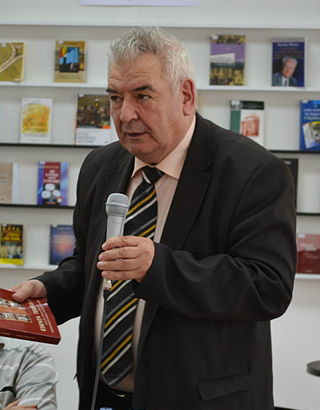
Mihai Cimpoi is a Moldovan politician, a distinguished cultural scientist, Romanian academician, critic and literary historian, eminescologist, literary editor and Bessarabian essayist. "Emeritus of the Republic of Moldova", two decades elected president of the Union of Writers of Moldova, deputy in the Parliament of the Republic of Moldova between 1999 and 2001, Mihai Cimpoi is the author of some fundamental works such as: "An Open History of the Romanian literature in Bessarabia" and "Mihai Eminescu. Encyclopedic Dictionary" - a unique monumental work. Mihai Cimpoi is the author and developer of the long-term project "The World Congress of Eminescologists", launched in 2012 and became a tradition.
Silviu Berejan was a Romanian philologist, lexicologist and linguist from Bessarabia, one of the titular members of the Academy of Sciences of Moldova, the romance linguistic specialty and Slavic, principal scientist at the Institute of Linguistics of the Academy of Sciences of Moldova.

Andrei Eșanu is a historian, writer and researcher from the Republic of Moldova. He is a member of the Commission for the Study of the Communist Dictatorship in Moldova. He is part of the Academy of Sciences of Moldova, and was elected an honorary member of the Romanian Academy in 2011.

Ion Țurcanu is an author, educator, historian, memoirist, professor, former member of the Parliament (1990–1994), politician and Romanian writer from Moldova. He is one of the 277 MPs of the first parliament of the former Soviet Socialist Republic, who voted for the Declaration of Independence of the Republic of Moldova on 27 August 1991.

Dumitru Matcovschi was a writer from Moldova who was a member of the Academy of Sciences of Moldova. He was a founder of the Popular Front of Moldova.
Lidia Istrati was a writer and politician from Moldova. She was born to Nicolae and Xenia and had a PhD in biology.

Anatol Ciobanu was a Moldovan professor and researcher. He was head of the Department of Romanian language at Moldova State University, a corresponding member of the Academy of Sciences of Moldova, and a leader of the Democratic Forum of Romanians in Moldova.

Ion Ciocanu was a Moldovan literary critic.
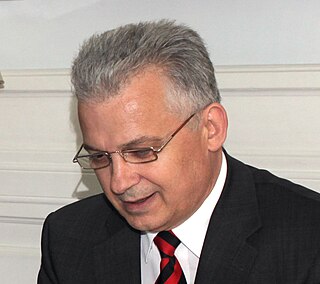
Mihai Balan is a Moldovan diplomat. He was the ambassador of the Republic of Moldova to Israel in January–October 2012, and prior to this was ambassador of Moldova to Greece and Cyprus. Bălan was the Foreign Policy Advisor to the President of Moldova.

Doina and Ion Aldea Teodorovici was a Moldovan musical duo consisting of married couple Doina and Ion Aldea Teodorovici. The group disbanded in 1992, after both members died in a road traffic accident in Coșereni. Today, there is a monument to them there, as well as another in Chișinău.
Rațiu is a Romanian-language ethnonymic surname. It derives from the Hungarian-language term rác . Notable people with the surname include:
Sârbu is a Romanian-language ethnonymic surname, used in both Romania and Moldova, as well as throughout the Balkans. Meaning "Serb", it is one of the most common surnames denoting ethnic origin; according to folklorist Pericle Papahagi, it has a very early presence among the Aromanians, evidencing their direct contacts with the White Serbs. "Unusually popular among the Daco-Romanians", it makes its first recorded appearance among the boyardom of 1430s Moldavia, distinguishing "Bodea Sârbul" from another Bodea, nicknamed Rumârul [sic], "the Romanian". Philologist Ioan Bilețchi-Albescu argues that "Sârbu" and other related surnames indicate voluntary Romanianization, or "merging into the Romanian mass", on the part of Romanian Serbs. It is conceptually related to the name "Rațiu", which is much more widespread in Transylvania and ultimately derives from the Hungarian-language rác ("Rascian").

On 18 September 2022, protests in Moldova began in the capital city of Chișinău, demanding the resignation of the country's pro-Western government, amid an energy crisis causing rising natural gas prices and inflation, caused in part by the Russian invasion of Ukraine.